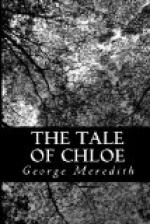But the distinctiveness of a Duchess of Dewlap with the hair and cheeks of our native fields, was fraught with troubles outrunning Mr. Beamish’s calculations. He had perceived that she would be attractive; he had not reckoned on the homogeneousness of her particular English charms. A beauty in red, white, and blue is our goddess Venus with the apple of Paris in her hand; and after two visits to the Pump Room, and one promenade in the walks about the Assembly House, she had as completely divided the ordinary guests of the Wells into male and female in opinion as her mother Nature had done in it sex. And the men would not be silenced; they had gazed on their divinest, and it was for the women to succumb to that unwholesome state, so full of thunder. Knights and squires, military and rural, threw up their allegiance right and left to devote themselves to this robust new vision, and in their peculiar manner, with a general View-halloo, and Yoicks, Tally-ho, and away we go, pelt ahead! Unexampled as it is in England for Beauty to kindle the ardours of the scent of the fox, Duchess Susan did more—she turned all her followers into hounds; they were madmen: within a very few days of her entrance bets raged about her, and there were brawls, jolly flings at her character in the form of lusty encomium, givings of the lie, and upon one occasion a knock-down blow in public, as though the place had never known the polishing touch of Mr. Beamish.
He was thrown into great perplexity by that blow. Discountenancing the duel as much as he could, an affair of the sword was nevertheless more tolerable than the brutal fist: and of all men to be guilty of it, who would have anticipated the young Alonzo, Chloe’s quiet, modest lover! He it was. The case came before Mr. Beamish for his decision; he had to pronounce an impartial judgement, and for some time, during the examination of evidence, he suffered, as he assures us in his Memoirs, a royal agony. To have to strike with the glaive of Justice them whom they most esteem, is the greatest affliction known to kings. He would have done it: he deserved to reign. Happily the evidence against the gentleman who was tumbled, Mr. Ralph Shepster, excused Mr. Augustus Camwell, otherwise Alonzo, for dealing with him promptly to shut his mouth.
This Shepster, a raw young squire, ‘reeking,’ Beau Beamish writes of him, ‘one half of the soil, and t’ other half of the town,’ had involved Chloe in his familiar remarks upon the Duchess of Dewlap; and the personal respect entertained by Mr. Beamish for Chloe so strongly approved Alonzo’s championship of her, that in giving judgement he laid stress on young Alonzo’s passion for Chloe, to prove at once the disinterestedness of the assailant, and the judicial nature of the sentence: which was, that Mr. Ralph Shepster should undergo banishment, and had the right to demand reparation. The latter part of this decree assisted in effecting the execution of the former. Shepster declined cold steel, calling it murder, and was effusive of nature’s logic on the subject




